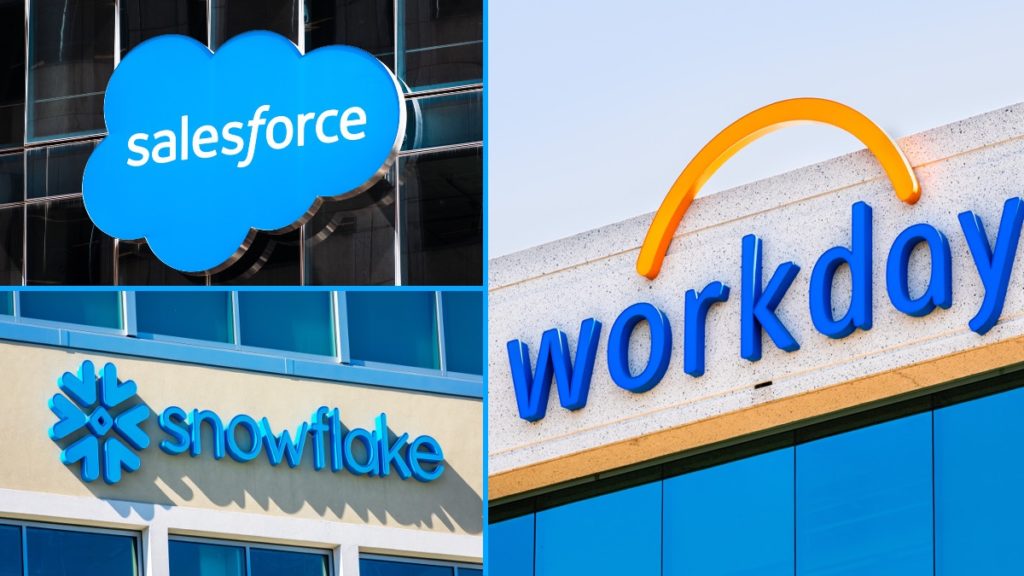
Three high-profile cloud vendors post fiscal-Q2 results this week and I’m expecting the results from Salesforce, Workday, and Snowflake will each, to use polite terminology, flip off the broad slowdown hammering major swaths of the global economy.
The results will be particularly interesting because they’ll be coming from three companies that have almost zero competitive overlap: Salesforce is the undisputed global kingpin in CRM, Workday is a leading player in HCM and Financials, and high-flying Snowflake is the disruptive category creator in the red-hot data-cloud space.
So, we shall see if corporate demand for those distinctly different types of cloud solutions and capabilities overcomes the downward drag of rampant inflation and deep concerns among business leaders that expenses need to be pulled in pretty aggressively.
I’m betting each company will inform us this week that customer demand has indeed overcome broader concerns about the economy because more and more business leaders now view cloud technologies as indispensable tools for connecting with customers, making smarter business decisions more quickly, and delivering superb customer experiences.
Just 3 months ago, Workday co-founder and co-CEO Aneel Bhusri nailed it when he said, “Our products are not choices,” by which he meant that applications for running HR and Financials have become indispensable for businesses looking to grow and thrive in the acceleration economy. I’ve shared some deeper analysis of Bhusri’s comment in this episode of our Cloud Wars Minute daily video show.
This week, we’ll get a chance to see if Bhusri’s contention will hold up — and I believe it will. So, here are my outlooks for what we’ll hear this week from Salesforce (August 24), Workday (August 25), and Snowflake (August 24), each of which will be reporting results for their fiscal Q2’s ending August 31.
Salesforce
My projection: revenue up 22% to $7.73 billion
From my August 12 analysis called Salesforce Q2 Preview: Will Results Be “Amazing” or “Incredible?”:
“In an environment like today’s, businesses and business leaders need to be smarter, faster, and completely attuned to their customers’ rapid shifts and fluctuations. That’s a capability Salesforce has been focusing upon for the past few years with Customer 360, its industry clouds, and the acceleration of its platform services.
Because of that revitalized operating model and go-to-market structure, plus the attendant enhancements across its vast product lineup, I’m projecting that Salesforce will report a fiscal-Q2 revenue increase of 22% to $7.73 billion when it releases its results on August 24.”
Workday
My projection: revenue up 20% to $1.51 billion
With Workday on a projected arc to $10 billion within the next few years, the company believes that a combination of its expanded product line — now serving almost every facet of Finance and HR, and with more industry focus expected soon — and its hard-earned customer loyalty will serve it well in today’s unsettled economic environment. The company’s growth rate has been accelerating for the past few quarters, and if Bhusri’s belief that “our products are not choices” holds true, then Workday might well come in at 21% or 22%.
Snowflake
My projection: product-revenue growth of 75% to $446 million
From my recent analysis headlined Frank Slootman’s Biggest Challenge: Keeping Snowflake on CXO’s A-List:
“My guess is they’ll come in right around 75%, which is clearly a drop from the previous quarter’s 84% but nevertheless an exceptional performance, given not only the budget cutbacks made by many customers but also the fact that the major cloud players totally bushwacked by Slootman’s “data cloud” positioning are finally getting their data-cloud acts together.
“For example, late last month, the CEO of Google Cloud parent Alphabet said that in Q2, Google Cloud continued “to lead” the data cloud category, although Sundar Pichai offered no data or reference to support that claim. In spite of that vagueness, however, Pichai’s mention of data cloud as the very first of four reasons why customers are picking Google Cloud gives us a very clear idea of the strategic significance Google Cloud is placing on data cloud. You can find out more on that in our recent Cloud Wars Minute episode, Google Cloud Lists Four Flavors of Customer Love.”
Final Thoughts
For each company, the test of maintaining growth rates during a time of cost-cutting by most businesses will give us an indication of just how indispensable business leaders believe these cloud high-flyers have become.
My guess is that Salesforce, Workday, and Snowflake will all pass that test, regardless of the significant challenge it poses in these uncertain times.









